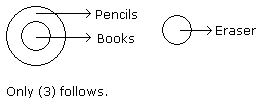Discussion
Home ‣ Verbal Reasoning ‣ Syllogism See What Others Are Saying!
- Question
- Statement:
Some roads are ponds.
All ponds are stores.
Some stores are bags.
Conclusions:
I. Some bags are ponds.
II. Some stores are roads.
Options- A. if conclusion I follow
- B. if conclusion II follows
- C. if either conclusion I or II follows
- D. if neither conclusion I nor II follows
- Correct Answer
- if conclusion II follows
ExplanationAll ponds are stores + Some stores are bags = I + A = No conclusion Hence I does not follow. Some roads are ponds + All ponds are stores = I + A = I = Some roads are stores ? conversion ? Some stores are roads (I) Hence II follows.
- 1. NA
Options- A. 1
- B. 9
- C. 48
- D. 16 Discuss
- 2. Find the odd one out:
Options- A. Football
- B. Kho-Kho
- C. Hockey
- D. Carom Discuss
- 3. Find the odd one out:
Options- A. 1593
- B. 3781
- C. 7359
- D. 9175 Discuss
- 4. Poor : Money
Options- A. Weak : Bold
- B. Bold : Dark
- C. Strong : Body
- D. Weak : Strength Discuss
- 5. Statements: All the books are pencils. No pencil is eraser.
Conclusions:
- All the pencils are books.
- Some erasers are books.
- No book is eraser.
- Some books are erasers.
Options- A. Only (3)
- B. Only (1) and (3)
- C. Only (1) and (2)
- D. Only (2) and (3)
- E. Only (3) and (4) Discuss
- 6. NA
Options- A. Fingers
- B. Hands
- C. Ears
- D. Eyes Discuss
- 7. If the expression E < J ? H > Z'. 'H ? Y' and 'E > F' true. Which of the following conclusions will be definitely false?
Options- A. F < Y
- B. Y > E
- C. F < H
- D. J ? Y Discuss
- 8. Brain : Neurology
Options- A. Biology : Animals
- B. Hydrology : water
- C. Body : physiology
- D. Entomology : plants Discuss
- 9. Which two people cannot be a part of the same team?
Options- A. I and J
- B. A and D
- C. B and D
- D. A and C Discuss
- 10. In H + I ÷ L, how is L related to H?
Options- A. Brother
- B. Sister
- C. Cousin
- D. brother-in-law Discuss
More questions
Correct Answer: 48
Explanation:
Only '48' is not square of any number.
Correct Answer: Carom
Explanation:
Carom is an indoor game.
Correct Answer: 3781
Explanation:
3781 is the odd one out as other numbers contain only odd digits.
Correct Answer: Weak : Strength
Explanation:
First indicates the lack of the second.
Correct Answer: Only (3)
Explanation:

Correct Answer: Fingers
Explanation:
All others are two in number.
Correct Answer:
Explanation:
F < E < J ? H > Z H ? Y and Z < H
Correct Answer: Body : physiology
Explanation:
As study of 'Brain ' is called 'Neurology', similarly, 'study' of Body is called 'physiology'.
Correct Answer: A and C
Explanation:
A and C cannot be part of the same team since F has to be always selected with C but never with A.
Correct Answer: brother-in-law
Explanation:
as we don't know the gender of L.
Comments
There are no comments.More in Verbal Reasoning:
Programming
Copyright ©CuriousTab. All rights reserved.
